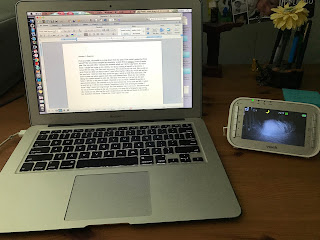Artist Residency in Motherhood: Week One Embrace the Chaos
I've made incremental shifts to prioritize the writing life and in general have been attuned to letting go of the perfect expectations that come with parenting. Importantly, I'm following my curiosities
where they lead me and paying attention to time. Time and motherhood has an elastic relationship; you feel it moving, as is often said, slowly and quickly. Also, true if you want a child to nap longer, she won't, and if you want a child to take a short nap because you'd like not to have to wake her to go somewhere, she will, inevitably decide that's the day she wants a long nap. My intention, my focus on the writing or writing life, for however brief or long I have is something in and of itself. I'm not and never will be a great multitasker but I'm trying to learn what I can do with M present and not. I can, for example, look up journals to send poems, edit perhaps aloud, but I can't really write a poem with her there - given calls for attention, feedings, diapers, and generally indescribable and unknown 10 month old frustrations or discoveries. To no surprise, it turns out I'm not like Lucille Clifton, whom I remember reading somewhere could compose poems while balancing a baby on her hip and cooking. I now have even more respect for her than I did previously since becoming a mother.
That I got a worthy poem out of it this week seems like
a bonus - one I happily accept.
We’ve
had some setbacks to be expected including teething (M), food poisoning (me),
unexplainable belly rash (M), sleep deprivation (both of us), but we are
already embarking on an interesting project.
At
the encouragement of a good friend, I have been looking at paintings from the
1600s until the present depicting mothers at work with their children. Here
are a few of my favorites (the woman in Cassat's painting is working I'd argue since she is mothering, and I guess I just fell in love with the painting and the possibilities suggested):
 |
| Mother and Child (The Oval Mirror) Mary Cassat 1899 |
 |
| The Lacemaker Nicolaes Maes 1656 |
I
hoped that the images would help me visualize my intentions, but what happened
unexpectedly is that they served my imagination in writing. Here are a few
images of me working or attempting to work with M for comparison:
Following
my path of curiosity doesn’t mean I leave M behind. On a hot, humid typical DC swamp day, I
took her to a used bookstore, and while she lunched later, I gushed over our
spoils with her. She was more impressed with the variety of her lunch that day
which included sweet potato cubes, avocado, and strawberries (her current
favorite). I’m seeing some potential erasure poetry projects, which is always a
good idea for writing a poem when you don’t really want to write a poem but
just want to feel like you are.
I’m interested in exploring as well the potential of tomorrow’s eclipse. Eclipses are natural disorders, disturbances
intended to shake things up. Interestingly,
I feel like without consciously doing so, I am purposefully reordering,
disturbing my habits of mind. What seemed
once competitive in spirit may no longer need to be so. Sometimes the universe needs a disruption to realign itself on the path of justice and goodness. (Maybe I'm just telling myself that). We've certainly had disruption on a national level which I also wrote about this week.
I’m not one for superstition or conspiracy
theories any more than the rest of us are (this is a great article in the Atlantic "How America Lost Its Mind"), but I am one for
Shakespeare. This passage seems apropos to
our present historical moment as it was in the 1600s.
These late eclipses in the sun and moon portend no good to us. Though the wisdom of nature can reason it thus and thus, yet nature finds itself scourged by the sequent effects. Love cools, friendship falls off, brothers divide, in cities mutinies, in countries discord, in palaces treason, and the bond cracked ’twixt son and father. This villain of mine comes under the prediction—there’s son against father. The king falls from bias of nature—there’s father against child. We have seen the best of our time. Machinations, hollowness, treachery, and all ruinous disorders follow us disquietly to our graves.
King
Lear, Act
I, scene 2
Sometimes transformation to our better human nature comes out of chaos and disorder.




Comments
Post a Comment